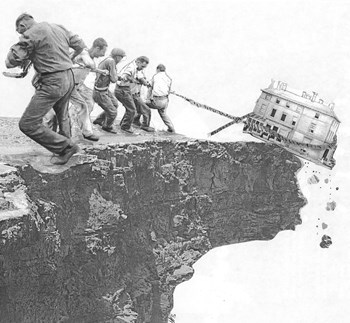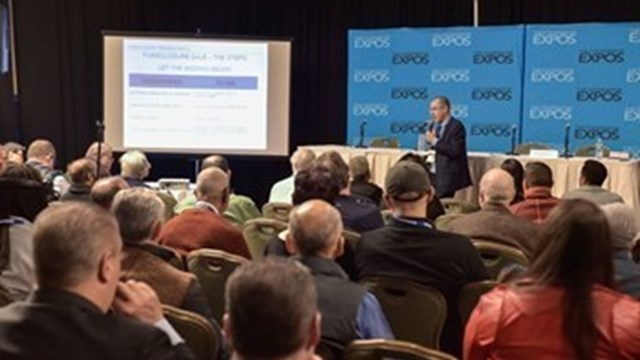
It happens infrequently, but when it does, it can be an enormous challenge: a co-op corporation or condo development has a long-running squabble with the building sponsor/developer, falls victim to long-term mishandling of funds — or outright fraud—by the board, or has to undertake a major unexpected or ill-prepared-for repair project. All of a sudden, they’ve got no money in the reserve fund, they can’t borrow against the property to make vital repairs, and residents are beginning to think they may have made a poor investment. Suddenly the whole building is on the precipice of insolvency. It’s a scary situation —but there are ways to edge back from the brink of financial wreck and ruin and get back on track. Here are some stories of communities who did just that.
Running the Numbers
At the end of the day, keeping a building solvent is about math. The money coming in has to be greater than or equal to the money going out. Extreme variation in either of the two sides of the equation can push a building towards financial difficulty. There are any number of ways, sudden or gradual, that this can come about.
The first reason is simple mismanagement. “Where communities fall into problems is when they don’t pay attention to what their building needs,” explains Enid Hamelin, longtime property manager and current board member at the Butterfield, a co-op in New York City. “They have no concept of the preservation of the structure of the building. They have not planned for it.” For example, there are a number of prewar buildings in New York, built during the Roaring Twenties. These are often coveted addresses, with their oversized apartments, high ceilings, interesting features, and so forth. But they are old. And with age comes the need for renovation. So it’s especially important in that type of building to be vigilant and plan carefully.
“There’s some instances when you see it,” says Jeffrey Reich, a partner with New York City-based law firm Schwartz Sladkus Reich Greenberg Atlas LLP. “Boards aren’t watching the store. They hold common charges and maintenance down and don’t let them grow with expenses, or maybe cover it with a flip tax or some other income they get. They’re not keeping up, and they’re in a hole. There can be some slow burns.”
Another way co-ops and condos get into trouble: unforeseen expenses. Out of nowhere, a building that has been in the black suddenly finds itself in urgent need of funds. Maybe the roof has deteriorated years before anyone thought it would. Maybe the elevators stop working. Maybe a lawsuit wasn’t decided in the community’s favor, or the damage caused by a major weather event wasn’t covered by the condo or association’s insurance. When comparing associations that have been successful to those that haven’t, Tim Haviland, senior vice president of commercial lending and community association loan program at Oak Brook-based Inland Bank and Trust, says he looks closely at those that have—to see the financial path that they took. “One of the most important things is the personality of the association and the makeup of the homeowners,” he says. “They have the responsibility to elect good leaders. A lot of times, those that don’t, don’t understand the rules of living in an association. Once they select good leaders and board members, they need a board that sets a good budget that makes sense — with ongoing upkeep of the building and putting away reserves for repairs they know will be needed. Finally, the homeowners need to pay on time so the cash flow stream remains the lifeblood of the association.”
Mark R. Rosenbaum, an attorney and principal at the Chicago-based law firm of Fischel & Kahn, Ltd., says even if you have a well-run association and stable reserves, something big can come along out of nowhere and change things in a hurry. “Take an event like a hurricane, which causes a great deal of damage and causes maintenance issues that can overwhelm it,” he says. “Even with reserve funds, it can find itself facing an enormous job no one was prepared for and cause financial problems.”
When these events happen, boards react by doing what is necessary to raise the funds, either through assessments, tapping into capital improvement savings, or securing a new loan from a lender. “Usually you’re dealing with a situation where they are financially distressed and physically distressed,” says Paul Santoriello, president of Taylor Management in New Jersey. “You have a need and you don’t have the means to address it.”
Slow Starvation
It’s not hard to see how a four-alarm fire or 100-year storm could financially decimate a co-op or condo. The more insidious problem, however, and one that’s just as dangerous is not when there are unforeseen expenses, but when the revenue begins to dry up. “The bigger way they get into trouble is when the owners fail to make payments,” Reich says. “We saw it in 2008 and 2010.” Because of ripple effects from the Great Recession, owners and shareholders failed to make payments. If enough owners are in hot water, unable to pony up for maintenance and other common charges, says Reich, “That’s all she wrote.”
For his part, Brad Schneider, CPA, a certified fraud examiner and president of CondoCPA, in Elmhurst, Illinois, says financial disrepair is commonly caused by three different scenarios or a combination of the three.
Scenario one involves owners who have been hit by a difficult financial crisis, such as the previously-mentioned recession. That will cause more unit owners than normal to stop paying their assessments. Lack of payments will deplete the cash reserves and cause financial disrepair.
“Another scenario involves not funding adequately for reserves over multiple years. This will cause an eventual special assessment,” he says. “When owners are assessed a large special assessment, it can cause a significant rise in delinquencies and affect the daily operations of the association when not enough money is being received.”
The third scenario comes from not maintaining the property correctly. When assessments are kept artificially low and the property is not maintained, future special assessments will usually follow eventually.
“The common reasons are the board not doing their fiduciary duty by maintaining the property, so they can keep from increasing the assessments,” Schneider says. “Other reasons are being too lenient on delinquent owners. A system has to be in place so that when an owner does not pay, they know the association will aggressively follow up.”
In this case, the buildings less at-risk are obviously those whose shareholders and owners have higher net worth. But that doesn’t make them immune to major financial issues, say the pros. “With high-income communities, they normally have more flexibility if it slides into disrepair,” says one finance expert. “The higher net-worth homeowner has the ability to absorb a special assessment better or an increase due to a loan. When a lower income building gets in trouble, it’s harder to get out of it.”
Schneider feels it is less of an issue with high-income communities, thinking it is more of a pride issue where the owners do not want to be on the list of non-payers in high-income communities, so they will put up the money necessary to get out of trouble.
That these failures are not sudden doesn’t make them any easier to manage. It’s like waiting for a tsunami to hit. “When the shareholders or co-op owners aren’t paying, there’s usually a lead time,” Reich says. “We have two units in arrears, then we have 5%, then 10%, then it’s 20%.” The next thing you know, the boat is sinking.
Co-ops go insolvent very rarely; condos fail more frequently, but still not often — and insolvent condo associations are more concentrated in markets like Florida than New York or Chicago. But although financial collapse is rare, it definitely does happen. “A co-op could be foreclosed on by its lender,” Reich says. “If the co-op can’t meet expenses, banks will come in, and they could foreclose. If that happens, the individual shareholders remain liable for their share loans.” In short, they would be in debt, but without the ownership of the asset — an undesirable position indeed.
Steady As She Goes
So how do co-ops and condos in dire financial straits right the ship? “It’s like anything else,” Reich says. “The first step is admitting you have a problem.” The worst thing that a building or community can do is see the beginnings of a financial fallout and do nothing, hoping the problem will just go away. Savvy boards, managers and financial advisors need to meet the problem head-on and work together to reverse a bad situation.
From there comes an honest assessment of the underlying causes. “A board has to get arms around income and expenses,” Reich says. “If income is not being collected, they have to take necessary measures to get residents in arrears to pay. Pursue collection. Foreclosure, lawsuit, notifying lenders. [Boards] have to aggressively attack income issues. Try to cut costs. See what they can do to recapitalize, that is, refinance.”
Accounting and planning is critical. “Put together a financial plan,” Santoriello says. “Part of that is creating the cash that will be used to address the physical needs of the building.” Many HOAs are securing loans from banks, more so than ever before, because the rates are favorable, and banks find condo associations to be good investments. “It’s similar to a municipality,” he says.
Then it’s all about instituting best practices, to make sure a bad situation doesn’t recur.
“All buildings should have a reserve fund,” Hamelin says. “There are a number of ways to build one up. A lot of buildings have created flip taxes, buyers’ taxes. When a buyer buys into the building they have to pay 1-2% of the sale price as a fee to the co-op. On a million dollar apartment, you have a bundle of money that can go into the reserve fund.” Tax rebates received by the buildings can be squirreled away into the reserve fund as well, rather than distributed to the owners — a sort of preemptive assessment.
Knowledge of the building is also critical. “Walk the building,” Hamelin advises. “Walk the roof. Ask about the pipes. Find out how much the average employee gets paid. The hallways, the elevators, the security system, the laundry room. You have to know what your product is before you make any judgments. You can do this in a couple of hours — an education you don’t get if you just meet once a month.” And even this might not alone solve all problems down the line. “Any building can step into tar,” Hamelin says. “Really. It’s just one of those things.”
“Taking those measures, buildings turn around,” says Reich. “How long does it take? Depends on how deep a problem it is. It could take years.”
Santoriello agrees. “To dig out of a hole will take time.”
Greg Olear is a published novelist and a regular contributor to The Chicagoland Cooperator.






Leave a Comment